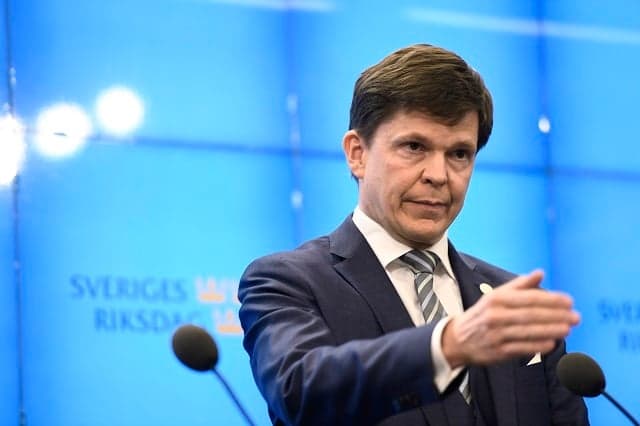What next for Sweden after centre-right failure to form a government?

After the leader of Sweden's centre-right party announced his failure on Sunday to form a workable coalition government, what's next for Sweden?
Moderate Party leader Ulf Kristersson was given the task of trying to form a government by parliamentary speaker Andreas Norlén, but on Sunday said he had not managed to do so.
This leaves Sweden facing a new round of parliamentary talks starting on Monday, after which Norlén will appoint another candidate to try to form a government. This could happen later the same day.
Since Sweden's September 9th election left the two main blocs separated by just one seat, arriving at a compromise has proved difficult.
Outgoing prime minister Stefan Löfven was ousted in a no-confidence vote last month, but other members of the centre-left bloc, made up of Löfven's Social Democrats, the Green Party, and the Left, have called for him to be given the task of trying to form a coalition next.
As the leader of the largest bloc in parliament, this seems a likely scenario.
READ ALSO: Everything you need to know about the Swedish election
Norlén has a total of four chances to ask a candidate to try to form a government that will be accepted by parliament -- and all four chances still remain, since parliament has not yet voted on any proposal.
It's not essential for a majority in parliament to support the proposal, but it will fail if a majority vote against it. Previously, parliament had always accepted the first proposal.
There are no time limits for the process and on Sunday Norlén said he would "not let [himself] get stressed by the fact that time is going by".
If none of these attempts are successful, the country will head for fresh elections, though this has never happened in Swedish history. In that case, the vote would be held within three months and only new parliamentary elections would be held, rather than repeating the municipal and regional votes which were held on the same day as the national election.
In the meantime, Löfven continues to lead a caretaker government. This has the same power as a regular government, but is expected to take care only of day-to-day issues and things that can't be postponed.
Comments
See Also
Moderate Party leader Ulf Kristersson was given the task of trying to form a government by parliamentary speaker Andreas Norlén, but on Sunday said he had not managed to do so.
This leaves Sweden facing a new round of parliamentary talks starting on Monday, after which Norlén will appoint another candidate to try to form a government. This could happen later the same day.
Since Sweden's September 9th election left the two main blocs separated by just one seat, arriving at a compromise has proved difficult.
Outgoing prime minister Stefan Löfven was ousted in a no-confidence vote last month, but other members of the centre-left bloc, made up of Löfven's Social Democrats, the Green Party, and the Left, have called for him to be given the task of trying to form a coalition next.
As the leader of the largest bloc in parliament, this seems a likely scenario.
Norlén has a total of four chances to ask a candidate to try to form a government that will be accepted by parliament -- and all four chances still remain, since parliament has not yet voted on any proposal.
It's not essential for a majority in parliament to support the proposal, but it will fail if a majority vote against it. Previously, parliament had always accepted the first proposal.
There are no time limits for the process and on Sunday Norlén said he would "not let [himself] get stressed by the fact that time is going by".
If none of these attempts are successful, the country will head for fresh elections, though this has never happened in Swedish history. In that case, the vote would be held within three months and only new parliamentary elections would be held, rather than repeating the municipal and regional votes which were held on the same day as the national election.
In the meantime, Löfven continues to lead a caretaker government. This has the same power as a regular government, but is expected to take care only of day-to-day issues and things that can't be postponed.
Join the conversation in our comments section below. Share your own views and experience and if you have a question or suggestion for our journalists then email us at [email protected].
Please keep comments civil, constructive and on topic – and make sure to read our terms of use before getting involved.
Please log in here to leave a comment.